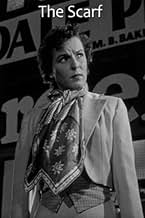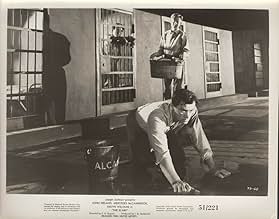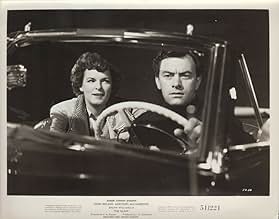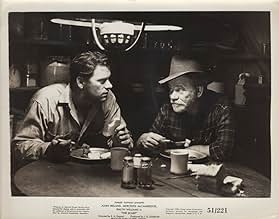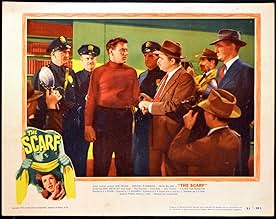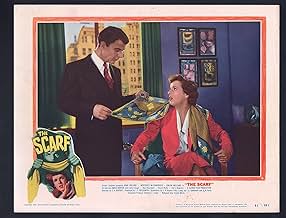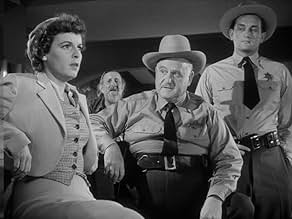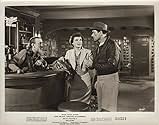A man believed to have murdered a woman, escapes from the insane asylum to find if he was the one who actually killed her using the scarf she was wearing.A man believed to have murdered a woman, escapes from the insane asylum to find if he was the one who actually killed her using the scarf she was wearing.A man believed to have murdered a woman, escapes from the insane asylum to find if he was the one who actually killed her using the scarf she was wearing.
- Director
- Writers
- Stars
- Awards
- 2 wins total
David Bauer
- Level Louie
- (as David Wolfe)
Iris Adrian
- Floozy
- (uncredited)
Richard Alexander
- Barfly
- (uncredited)
Barry Brooks
- Hospital Prison Guard
- (uncredited)
King Donovan
- Piano Player
- (uncredited)
John Frederick
- Deputy
- (uncredited)
Frank Hagney
- Floozy's Boyfriend
- (uncredited)
Frank Jaquet
- Town Sheriff
- (uncredited)
Frank Jenks
- Tom
- (uncredited)
Chubby Johnson
- Feed Store Manager
- (uncredited)
Tom Kennedy
- Asylum Inmate
- (uncredited)
- Director
- Writers
- All cast & crew
- Production, box office & more at IMDbPro
Featured reviews
Perhaps the script could have used a re-write, but otherwise this is a great movie with an excellent performance by James Barton, who has an intriguing back story, including being named one of Bing Crosby's favorite actors. McCabridge and Ireland have chemistry and are solid in their roles, and the former sings a fine song called "Summer Rain." It has a cynical view of human behavior, which, depending on your worldview, may be warranted, but the intelligently written script (despite some lapses) uses the three main characters to partially mitigate the cynicism. Recommended. P. S. If you are looking for non-stop action, this is probably not for you. There is a lot of dialogue, like a play, and Barton's character has some great lines as a farmer/philosopher.
Odd and very Strange Film-Noir. An Independent Production with a Low-Budget but High on Expressionism and Striking Scenes of Low-Brow, Everyday People in Their Environment.
John Ireland and Mercedes McCambridge are an Iconic Noir Couple. He of Intensity showing a Film-Noir Staple, Amnesia. Escaping from a Mental Institution and Confused about His Guilt (imprisoned for strangling a girl with a scarf and deemed "criminally insane").
McCambridge shows up in a Flashback (another Noir staple) Hitch-Hiking on a Road to Nowhere (a gig as a singer/waitress in a Dive). Her Nickname says it all, "Cash and Carry Connie". She is as Odd as Ireland with Her "Common and Unclassical" Look, Speaking in Short Clipped Sentences that Reveal Street Knowledge, Strength and a Fearful Cynical Attitude.
The Settings are Dismal and Bleak (prison, turkey ranch, and bar). James Barton, as the Turkey Ranch Owner, takes Ireland Under His Wing as the Search for the Truth Unfolds. All of the Characters in this Noir World are Offbeat and Interesting. Besides Our "Heroes", the Cops, Doctors, Farmer, Bar-Keep, and even the Piano Player are Bizarre and Noir.
Overall, this is an Off-Kilter Movie in every sense. Disturbing, Other Wordly, Shady, and Weird. Mercedes McCambridge, in this Underseen Gem, can Walk Alongside Ann Savage in "Detour" (1945) as a Quintessential B-Girl in a B-Movie with Style, Shocks, and Suspense. One of Film-Noir's Least Known and Unacknowledged Entries.
John Ireland and Mercedes McCambridge are an Iconic Noir Couple. He of Intensity showing a Film-Noir Staple, Amnesia. Escaping from a Mental Institution and Confused about His Guilt (imprisoned for strangling a girl with a scarf and deemed "criminally insane").
McCambridge shows up in a Flashback (another Noir staple) Hitch-Hiking on a Road to Nowhere (a gig as a singer/waitress in a Dive). Her Nickname says it all, "Cash and Carry Connie". She is as Odd as Ireland with Her "Common and Unclassical" Look, Speaking in Short Clipped Sentences that Reveal Street Knowledge, Strength and a Fearful Cynical Attitude.
The Settings are Dismal and Bleak (prison, turkey ranch, and bar). James Barton, as the Turkey Ranch Owner, takes Ireland Under His Wing as the Search for the Truth Unfolds. All of the Characters in this Noir World are Offbeat and Interesting. Besides Our "Heroes", the Cops, Doctors, Farmer, Bar-Keep, and even the Piano Player are Bizarre and Noir.
Overall, this is an Off-Kilter Movie in every sense. Disturbing, Other Wordly, Shady, and Weird. Mercedes McCambridge, in this Underseen Gem, can Walk Alongside Ann Savage in "Detour" (1945) as a Quintessential B-Girl in a B-Movie with Style, Shocks, and Suspense. One of Film-Noir's Least Known and Unacknowledged Entries.
The previous reviewer said it was a shame this film was never shown on any cable channels. I just saw it today on TCM (Turner Classic Movies). I had never seen it before, and have to agree it is a great example of the films noir of the '50s. There is a lot of suspense in the film with a "did he do it or not?" theme, where the protagonist has a loss of memory and can't recall the crime. Mercedes McCambridge is excellent in the film, and the bar scenes give us lots of the '50-era atmosphere. There are so few movies with Mercedes McCambridge that one can see anymore, so this movie is a treat if only for being able to see her. So don't give up hope. TCM's website is a great source for info on classic movies, and you can look up the dates and times they will be showing this film again.
It was rumored that after his role in ALL THE KING'S MEN, John Ireland had demanded too much from the studios. This smaller production is filmed in the same slow mist of the hero's memory. Mercedes McCambridge is excellent as the female support. James Barton gives great support on the male side. It is a strong well acted performance. It should be shown more often. It is a shame that features like this are not shown on today's cable systems or available in any format.
Two years after appearing in All The King's Men, John Ireland and Mercedes McCambridge reunite in The Scarf. Talented actors both, neither of them would enjoy, in number or in quality, movie roles commensurate with their gifts. A recondite find today, The Scarf could hardly have been much less so in 1951; under the `Gloria Productions' imprint, it fell to a German-born director of little reputation, E.A. Dupont.
But while not every emigrant from middle Europe was a Fritz Lang or Robert Siodmak or Billy Wilder, most had tradition behind them and a touch of inspiration, like John Brahm and Edgar G. Ulmer and even Dupont. Though The Scarf starts off dead slow a long, quasi-philosophical dialogue between a turkey-ranching hermit in the California desert (James Barton) and an escapee from an asylum for the criminally insane who has sought refuge with him (Ireland) soon enough the movie picks up its pace and shows flashes of originality and style. The cinematography is by Frank (Franz) Planer, another refugee steeped in Expressionism who had behind, and ahead of, him several noirs.
Not coincidentally, the quickened pace comes with McCambridge's arrival, as a singing bar waitress who hitches a ride with Ireland. With her distinctive organ-pipe voice and her instinct for biting off her lines clean, she brings both quirkiness and force to this standard role (tough gal, good heart). Though some of her best known roles showed noir influences (All The King's Men, Johnny Guitar) she only appeared in two obscure noirs (Lightning Strikes Twice was the other). The cycle is poorer for her rarity.
The Scarf's plot, alas, falls under the rubric far-fetched. It involves Ireland's not quite remembering the crime for which he was committed strangling a girl with her scarf and a sinister psychologist ( Emlyn Williams) somehow in the employ of Ireland's powerful father. Dupont can't do much with the bulk of it (who could?), but along the way sneaks in some arresting sequences. The best occurs when McCambridge has been ordered to leave town on the 11 p.m. bus for Los Angeles; as she vacillates, looking down the dark road at the sign reading `sheriff's station,' it turns into a lure for her to sell out Ireland for the reward on his head, with `$5000" spelled out in beckoning neon.
But while not every emigrant from middle Europe was a Fritz Lang or Robert Siodmak or Billy Wilder, most had tradition behind them and a touch of inspiration, like John Brahm and Edgar G. Ulmer and even Dupont. Though The Scarf starts off dead slow a long, quasi-philosophical dialogue between a turkey-ranching hermit in the California desert (James Barton) and an escapee from an asylum for the criminally insane who has sought refuge with him (Ireland) soon enough the movie picks up its pace and shows flashes of originality and style. The cinematography is by Frank (Franz) Planer, another refugee steeped in Expressionism who had behind, and ahead of, him several noirs.
Not coincidentally, the quickened pace comes with McCambridge's arrival, as a singing bar waitress who hitches a ride with Ireland. With her distinctive organ-pipe voice and her instinct for biting off her lines clean, she brings both quirkiness and force to this standard role (tough gal, good heart). Though some of her best known roles showed noir influences (All The King's Men, Johnny Guitar) she only appeared in two obscure noirs (Lightning Strikes Twice was the other). The cycle is poorer for her rarity.
The Scarf's plot, alas, falls under the rubric far-fetched. It involves Ireland's not quite remembering the crime for which he was committed strangling a girl with her scarf and a sinister psychologist ( Emlyn Williams) somehow in the employ of Ireland's powerful father. Dupont can't do much with the bulk of it (who could?), but along the way sneaks in some arresting sequences. The best occurs when McCambridge has been ordered to leave town on the 11 p.m. bus for Los Angeles; as she vacillates, looking down the dark road at the sign reading `sheriff's station,' it turns into a lure for her to sell out Ireland for the reward on his head, with `$5000" spelled out in beckoning neon.
Did you know
- TriviaLevel Louie's Bar is apparently in the 500 block of South Main Street, as the Gayety Theatre @ 523 South Main is directly across the street, thanks to a rear projection visible in several shots. The names of Randolph Scott and Don Ameche appear on the marquee; it was the Gayety's policy of listing the players rather than the titles of the films, on their readerboard.
- GoofsWhen Ezra tells the Sheriff and others that his turkeys were disturbed about two hours beforehand, it would be expected that they would investigate to try and find tracks where Barrington had been and to see what direction he had taken away from the farm. Instead they just say good night and leave.
- Quotes
Ezra Thompson: I came here fifteen years ago to be by myself. Haven't got a mirror in the place. Even my own reflection's too much company. Let me tell you something, you're either a fool, or you're bats. Does the word 'bats' means anything to you outside of baseball?
- ConnectionsReferences The Man Who Came to Dinner (1941)
- SoundtracksSummer Rains
Music and lyrics by Sammy John DeFazio, Charles Milton Daniels (as Charles Milton Daniel) and Gilbert Hugh Hall
Performed by Mercedes McCambridge (uncredited)
[Connie sings the song several times at Level Louie's]
- How long is The Scarf?Powered by Alexa
Details
- Release date
- Country of origin
- Languages
- Also known as
- Stryparen
- Filming locations
- Los Angeles Times - 202 W 1st St, Los Angeles, California, USA(David Dunbar's office building)
- Production company
- See more company credits at IMDbPro
- Runtime
- 1h 33m(93 min)
- Color
- Aspect ratio
- 1.37 : 1
Contribute to this page
Suggest an edit or add missing content

